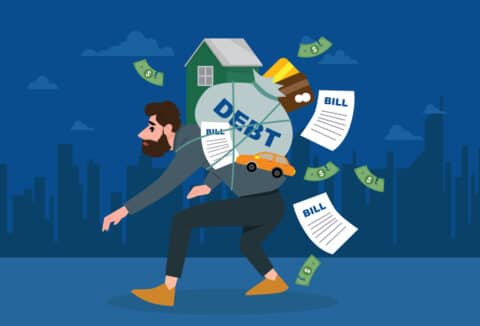Can I Refinance My Car and Get Cash Out?
Emergencies can happen at any time, and often when we least expect them. You could suffer an injury or health issue and face costly medical bills. Your home might require costly repairs that were unforeseen. When these challenging financial times arise, you may find that you’re in need of a significant cash infusion to help you pay for these unexpected expenses.
If you still owe money on your car loan, one potential option is cash-out auto refinancing. This process will allow you to refinance your car loan and receive a lump sum of cash back as part of the refinance process, providing you with some much needed money to cover the expenses you’re facing.
What Is Cash-Out Auto Refinancing?
Cash-out auto refinancing is similar to traditional car loan refinancing in many ways. You are replacing your existing car loan with a new loan that ideally provides better terms such as a lower interest rate. However, with cash-out auto refinancing, you are taking out a loan for more than the amount you currently owe on your car, and you will receive this additional money as a lump sum cash payment at the time you refinance your car loan.
For example, if you still owe $8,000 on your car loan and you’re approved for a $12,000 cash-out refinance, you’ll receive the additional $4,000 in cash. Keep in mind that you’ll be responsible for paying off the entire $12,000 value of the new loan, including all interest that accrues.
If one of your goals of cash-out refinancing is to lower your monthly payments, you may potentially need to extend the loan term to keep your payments at an affordable rate. In this situation, you will accrue more interest over the lifetime of the loan since you’re paying off the new car loan over a longer period of time.
How Much Money Can I Receive with Cash-Out Refinancing?

- Your car’s value – Most lenders won’t let you borrow more money than the car is worth since this creates a risk that you won’t be able to pay off the loan if the vehicle is totaled in an accident. Therefore, the amount of cash you can get back often depends on the equity you have in the vehicle. For example, if the vehicle is worth $3,000 more than you owe on your existing loan, your cash back will likely be capped at $3,000.
- The lender – Some lenders may allow you to borrow up to 100% of the vehicle’s value, while other lenders may set limits on the amount of cash you can get back when you refinance.
- Your credit – As with any car loan refinance, your credit score and history will be a primary factor used by lenders when deciding how much money they’ll give you for a loan.
What Are the Benefits of Cash-Out Refinancing?
There are several potential benefits of cash-out refinancing:
- Better loan terms
- Lower monthly payments
- Cash back
Better Loan Terms
If your credit score has improved since you took out your initial car loan or interest rates have dropped, you may be able to lower your interest rate when you refinance. Depending on how much extra cash you take out and how much of a lower rate you receive, this can potentially reduce the amount you spend over the lifetime of the loan.
Lower Monthly Payments
You can also lower your monthly payments with cash-out refinancing. In some instances, you may be able to lower your payments while keeping the same repayment term if your interest rate reduction is significant enough. However, you may need to extend your repayment term to lower your monthly payment due to the extra money you’re borrowing. In this situation, you will pay more interest over the lifetime of the loan.
Cash Back
If you’re in need of extra money, cash-out refinancing can help you obtain these funds at a lower interest rate than many other options, such as pay day loans, which force you to incur high-interest debt.
What Are the Risks of Cash-Out Refinancing?

- Becoming upside down on your car loan
- Limited lender options
- Incurring additional debt
- Repossession
Becoming Upside Down on Your Car Loan
Since you’re taking out a larger loan than the one you currently owe, you are at greater risk of going upside down on your car loan. This is especially true if you take out a loan for 100% of your car’s current value.
As your car depreciates over time, your loan-to-value ratio could get to a point where you owe more on the new loan than the car is worth. If this happens, you may have trouble selling or trading in the vehicle before the loan is paid off, and you may owe money out of pocket if your car gets totaled in an accident before the loan is paid off.
Limited Lender Options
Not all lenders offer cash-back refinancing, so you may have fewer refinancing options. This may impact your ability to secure the best possible interest rates when you refinance.
Incurring Additional Debt
Since you’re borrowing more money than you currently owe on your existing car loan, you will have more debt to pay off after refinancing.
Repossession
If your monthly payment increases or your loan repayment term extends as part of cash-out refinancing, you may find it difficult to make your monthly payments over the lifetime of the loan, especially if you are struggling financially. This can increase the risk that your car will get repossessed in the event that you default on the loan.
When Should I Consider Cash-Out Auto Refinancing?

In general, cash-out auto refinancing may be a good option if:
- You’re in need of additional cash – If you’ve experienced a financial emergency, cash-out refinancing can provide the money you need to cover these expenses.
- You want to pay off high-interest debt – If you have significant debt at high interest rates, such as credit card debt or a personal loan, cash-out refinancing can potentially help you pay off this high-interest debt and replace it with a lower interest loan.
iLending Makes Car Loan Refinance Easy and Hassle Free
If you’re considering cash-out refinancing, iLending can help. We currently offer a MAX $1,000 cash out program, but the terms of our program may change as market conditions shift over time.
In addition, our You First Approach™ makes car loan refinance easy and hassle free. As part of this unique approach, you’ll be paired with a loan consultant who will discuss your refinancing goals in detail. If one of your goals is to get cash back, make sure to bring this up during your initial conversation. This will ensure your loan consultant specifically searches for lenders who will offer you this option.
Your loan consultant will compare options throughout our network of over 50 nationwide lenders to determine the best loans to address your specific needs. This process helps ensure you receive the best possible rates when seeking cash-out refinancing. Your loan consultant will review the best solutions with you and answer any questions you may have.
Once you’ve picked a loan option, our team will handle the entire process for you. We’ll fill out all the paperwork and follow up with your existing lender to ensure your existing loan is paid off properly. This provides a smooth experience throughout every phase of the process and gives you peace of mind that your car loan refinance is handled properly.
Apply now to get the car loan refinance process started.
